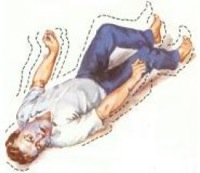Difference between revisions of "Convulsion"
(Created page with 'File:lighterstill.jpgright|frame ==Origin== Latin convulsiōn-em, n. of action < convellĕre (see convulse n.), or perhaps im med. < French convu...') |
m (Text replacement - "http://" to "https://") |
||
| Line 2: | Line 2: | ||
==Origin== | ==Origin== | ||
| − | [[Latin]] convulsiōn-em, n. of action < convellĕre (see convulse n.), or perhaps im med. < French convulsion (16th cent.). The medical sense was already used in Latin by [ | + | [[Latin]] convulsiōn-em, n. of action < convellĕre (see convulse n.), or perhaps im med. < French convulsion (16th cent.). The medical sense was already used in Latin by [https://en.wikipedia.org/wiki/Pliny Pliny] and the medical [[writers]]. |
| − | *[ | + | *[https://en.wikipedia.org/wiki/16th_century 1547] |
==Definitions== | ==Definitions== | ||
*1: an abnormal [[violent]] and involuntary contraction or series of contractions of the [[muscles]] | *1: an abnormal [[violent]] and involuntary contraction or series of contractions of the [[muscles]] | ||
*2a : a violent disturbance | *2a : a violent disturbance | ||
==Description== | ==Description== | ||
| − | A '''convulsion''' is a medical condition where [[body]] muscles contract and [[relax]] rapidly and [[repeatedly]], resulting in an uncontrolled shaking of the body. Because a convulsion is often a [[symptom]] of an [ | + | A '''convulsion''' is a medical condition where [[body]] muscles contract and [[relax]] rapidly and [[repeatedly]], resulting in an uncontrolled shaking of the body. Because a convulsion is often a [[symptom]] of an [https://en.wikipedia.org/wiki/Seizure epileptic seizure], the term convulsion is sometimes used as a synonym for ''seizure''. However, not all epileptic seizures lead to convulsions, and not all convulsions are caused by epileptic seizures. Convulsions are also [[consistent]] with an electric [[shock]]. For non-epileptic convulsions, see [https://en.wikipedia.org/wiki/Non-epileptic_seizures non-epileptic seizures]. Convulsions may also be referred to as "fits" in some instances. |
[[Category: Health]] | [[Category: Health]] | ||
Latest revision as of 23:43, 12 December 2020
Origin
Latin convulsiōn-em, n. of action < convellĕre (see convulse n.), or perhaps im med. < French convulsion (16th cent.). The medical sense was already used in Latin by Pliny and the medical writers.
Definitions
- 1: an abnormal violent and involuntary contraction or series of contractions of the muscles
- 2a : a violent disturbance
Description
A convulsion is a medical condition where body muscles contract and relax rapidly and repeatedly, resulting in an uncontrolled shaking of the body. Because a convulsion is often a symptom of an epileptic seizure, the term convulsion is sometimes used as a synonym for seizure. However, not all epileptic seizures lead to convulsions, and not all convulsions are caused by epileptic seizures. Convulsions are also consistent with an electric shock. For non-epileptic convulsions, see non-epileptic seizures. Convulsions may also be referred to as "fits" in some instances.
